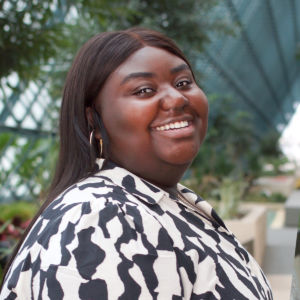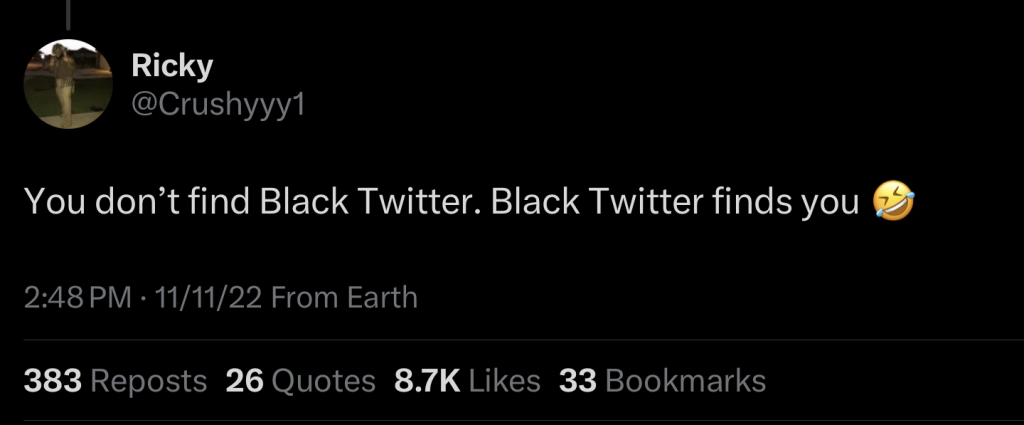
Black Twitter and the Need for More Authentic Digital Black Spaces
BY Kiki Marshall, Social Media Manager
As a social media manager who is unashamedly Gen Z, it’s only fitting that I am chronically online. When I tell people that Twitter is my favorite app, I always get the same responses: “Really?!” or, “That’s interesting.” or, “I never understood that app.” But after using it for almost 14 years, I’ve come to realize that my love of Twitter is because of Black Twitter.
Black Twitter isn’t a separate app or secret place you have to unlock; it is simply an interconnected space on Twitter that you reach by following, interacting, and communicating with Black people. It’s a safe space for laughter, communion, community, and serious discourse, but more importantly, it’s a place created by us for us.
This phenomenon is vital for Black people to connect and allows authentic cultural spaces to be held in Black media. And as we undeniably know, Black culture influences a large part of the media. However, the media landscape—historically skewed by biases and distortions, particularly towards Black people and other minorities—is undergoing a transformative era. The emergence of spaces like Black Twitter over the past decade exemplifies this shift, underscoring the importance of having dedicated spaces for Black voices in media.

Black Twitter: A Beacon of Cultural Authenticity and Strength
This platform has become a haven for Black voices, often marginalized in mainstream media. It gives us a stage for discussing the lived experiences of Black communities—the positive aspects, the challenges, and the harsh realities. In a world where our narrative is frequently misrepresented or diluted, Black Twitter stands as a pillar of authenticity and solidarity. It’s where we create dialogue about everything from pop culture moments that bring about discourse, like awards season snubs and their implications, to trending hashtags that become social justice movements, such as #StayMadAbby, #SayHerName, #ICantBreathe, and #OscarsSoWhite.
The Strength of Social Media for Amplifying Black Voices & Muted Group Theory
Social media platforms have become a powerful tool for Black people to assert their narratives and perspectives. These platforms allow for creating and disseminating content that challenges the status quo, offering a counter-narrative to the often distorted representation in mainstream media. Social media has democratized content creation, allowing Black voices to be heard, stories to be shared, and communities to form and mobilize around shared experiences and causes.
Incorporating communication theories like Muted Group Theory into the understanding of Black Twitter reveals the phenomena’s profound significance as a space where historically muted voices are not just heard but are influential.
Muted Group Theory highlights how power disparities cause people with disadvantaged identities to have their voices and experiences muted.
This helps us understand the importance of such platforms in balancing the scales of representation and discourse in the media. As we continue to witness the transformative power of Black Twitter, it’s a reminder of the ongoing need to support and amplify spaces where all voices, especially those that have been historically marginalized, can speak and be heard with the full richness and diversity of their experiences without the influence of outsiders.
Inclusion and Authenticity: Cultural Appropriation vs. Cultural Appreciation in Marketing
In all its forms, the media holds immense power in shaping societal attitudes and perceptions. The inclusion of authentic Black voices in media is not just about representation; it’s about reshaping the narrative and challenging the stereotypes that have long plagued the portrayal of African Americans. Companies and media outlets must move beyond superficial engagement with Black culture and commit to meaningful inclusion that respects and celebrates the diversity of the Black experience.
The line between cultural appropriation and appreciation is often blurred in marketing strategies targeting the Black community. Companies frequently adopt elements of Black culture to appear ‘trendy’ or ‘inclusive,’ yet this surface-level engagement often lacks depth and authenticity. Sometimes they even boast the inclusion of “Gen Z” language in marketing tactics without realizing that the language they use is directly linked to Black, POC, Queer, and Ballroom culture—whitewashing and diluting it in the process.
The appropriation of cultural elements without understanding or respecting their significance is a form of exploitation.
Businesses seeking to cater to Black consumers must involve those same Black voices at every stage of their marketing process. This inclusion goes beyond tokenism; it’s about ensuring that the portrayal and engagement with Black culture are respectful, authentic, and beneficial to the community.
Gratitude for Spaces of Open Dialogue and the Necessity of These Conversations
In reflecting upon the vibrant discussions and expressions found within the cultural phenomenon of Black Twitter, I appreciate the opportunity to engage in and contribute to these dialogues, especially within the context of a full-service communications and marketing agency like talkStrategy. This environment not only holds space for creativity and innovation but also encourages an exploration in which media and communication shape our understanding of race, culture, and identity.
These conversations, particularly within communications and marketing agencies, are essential—not to invite external validation or participation but to cultivate a more profound, shared understanding among ourselves. Engaging with the complexities of racial representation, cultural appropriation, and power dynamics in media requires a space where we can discuss, challenge, and refine our perspectives. It’s about building an internal culture that acknowledges and actively engages with each member’s diverse experiences and viewpoints.
Creating Genuine Inclusivity Within Organizational Culture
In discussing the significance of open dialogue and understanding, it’s imperative for business owners, clients, and potential clients to reflect on how they can contribute to creating genuinely inclusive work environments. The journey towards inclusivity is not just about implementing training but about nurturing a culture where every voice is heard, respected, and valued equally. Allowing the organizational culture to change through intentional action.
- Before jumping into workshops based on inclusion, start by looking at company policies that might be exclusionary. Also, take a look at how the current brand strategies might elevate or silence diverse voices.
- Understand the value and diverse perspectives, specifically from employees with socially disadvantaged identities (race, size, class, gender).
- Engage in meaningful discussions that may be uncomfortable without silencing voices.
These discussions help us to see beyond our individual experiences, understand the systemic structures that shape media narratives, and recognize the impact of our work on these narratives. By fostering open, honest, and informed conversations within organizations, we enhance our ability to create content that is not only innovative but also culturally sensitive and impactful.
The Unwavering Voice
The importance of platforms like Black Twitter in providing a space for Black voices cannot be overstated. We must support and amplify authentic Black voices to counteract the distortion and deception we continually see and ensure that the narrative of the Black community is told with the depth, complexity, and respect it deserves. Despite the general instability of Twitter as a platform due to changes over the past two years, Black Twitter has demonstrated remarkable resilience. A trait that is engraved in the Black experience. It continues to thrive, fostering a vibrant community that perseveres in amplifying Black voices, culture, and issues, emphasizing the communities adaptability and commitment to visibility and advocacy.
